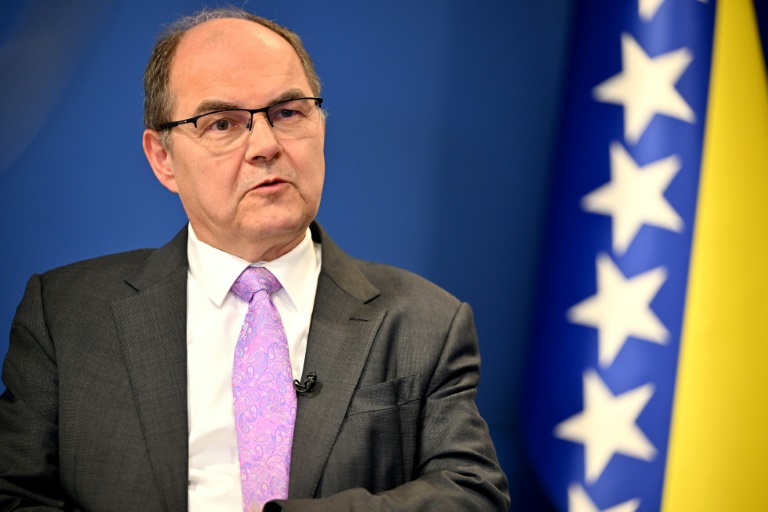Bosnia’s top international envoy has warned of Russia’s growing influence in the Balkan country amid a growing stand-off with the Moscow-backed Bosnian Serb leader Milorad Dodik.
“We should not give (Vladimir Putin) the last decision… on whether Bosnia Herzegovina has a path to European integration,” Christian Schmidt told AFP during an exclusive interview this week.
“But I think we should stop declaring everything as normal… we have to address this.”
His comments come as the envoy — who helps oversee the fractured state for the international community — is locked in a feud with Dodik, a long time Kremlin ally on trial for signing legislation that refused to recognise decisions made by Schmidt and Bosnia’s constitutional court.
The veteran German diplomat is charged with overseeing the enforcement of the Dayton Agreement that ended the country’s bloody civil war in the 1990s.
Dodik, however, has refused to recognise Schmidt’s authority after Russia and China dropped their support for the envoy.
In July, Schmidt struck down two laws passed by the parliament of Bosnia’s Serbian entity which refused to recognise him and the top court.
Dodik has remained defiant, vowing to fight the charges in a trial that marks a potential tipping point for post-war Bosnia.
The case will likely serve as a litmus test of the weak central government’s ability to hold a leading politician to account after openly flouting the country’s peace accords and court system.
Outside of court, Dodik has continued to flaunt his ties with Moscow.
Last month, President Putin awarded Dodik the Order of Alexander Nevsky, one of Russia’s highest medals, during a state visit by the Bosnian Serb leader.
Schmidt and others have warned that the ties with Moscow risk further inflaming tensions in the region after Russia’s invasion of Ukraine, which has driven a wedge through the Balkans.
“I would not exclude that some of the strategy is coming directly from Moscow,” Schmidt said of Dodik’s recent moves, as he denounced the Bosnian Serb leader’s “anti-European behaviour and his close relations to Putin”.
Schmidt’s comments come weeks ahead of the next meeting of the European Council in Brussels, which will likely be the last chance to open EU membership negotiations with Bosnia before June’s European elections.
Bosnia has been an official candidate for EU membership since 2022 but must implement a string of major reforms before opening accession negotiations.
So far, Bosnia has managed to pass Brussels-backed anti-money laundering legislation, but has yet to tackle more sensitive judicial reforms.
On Monday, German Foreign Minister Annalena Baerbock warned that delaying EU accession for the countries of the Western Balkans risked leaving them open to Russian “infiltration”.
“We cannot allow any grey areas in Europe and together we must do everything we can to protect the flanks that Russia can use for destabilisation, disinformation and infiltration,” she said ahead of a visit to the Balkans.
Bosnia has been governed by a dysfunctional administrative system created under the Dayton pact that divides the country into two bodies — a Muslim-Croat federation and a Bosnian entity known as Republika Srpska.
The two entities are guaranteed a large degree of autonomy and connected by a weak central government.
To help manage the complex governance system, the top envoy enjoys wide powers, including to impose or annul laws and sack elected officials.
Schmidt defended his powers saying they support and assist “local authorities to develop a functioning state.”
Asked whether the broad powers proved the incompetence of Bosnia’s politicians, Schmidt sent mixed signals.
“As a diplomat, I would probably say yes and no,” he told AFP. “As a politician, I have to say yes, there is a problem.”
AFP







